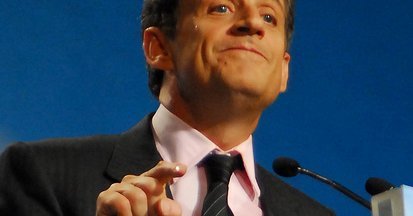The idea behind Sarkozy’s proposal is to allow the President of the French Republic to continue acting at the European level, even though his mandate of President of the European Council broke up in December. That is why the proposal presented would be to let him continue as President of the Eurogroupe until 2010.
A proposal similar to the Lisbon Treaty
The Presidency of the European Council is still rotating and changes every six months. The Lisbon Treaty introduced a more stable Presidency, with a President elected for two years and a half. Sarkozy is not aiming at chairing the European Council because it will be hardly feasible to postpone the Presidency of the two following countries to last until 2010. Instead, he would move to the Eurogroupe to lead the Europeans during the financial and economical crisis.
Even if it could seem an attempt to bypass the treaties, the logic behind this proposal is in line with the philosophy of the Lisbon Treaty which stabilises the representation of the European Union to improve its functioning.
Thus there is nothing really new with this proposal but the time. Nobody would have expected such initiative before the entering into force of the Lisbon Treaty. The latter is still blocked by the negative referendum in Ireland and, apparently, Sarkozy has decided not to wait until its ratification to position himself. Let’s hope that it is not a sign of resignation towards the final ratification of the Treaty.
Nevertheless, a controversial proposal
Although it might appear positive for Europe, this proposal was not perceived as such by all European countries, on the contrary. The actual President of the Eurogroupe Jean Claude Juncker, who was supposed to chair the Eurogroupe until 2010, was attacked for his inaction to face the crisis. The Germans were silent, hiding behind the fact that the proposal was still unofficial and put aside the question in front of journalists.
Even if Sarkozy has been very active as President of the European Council, the justification of his proposal still reminds the French arrogance towards other States and the division of the European states into two categories: first and second class Member States.
Whatever the proposed solution will be accepted or not, the European Union has a strong problem of governance of the Eurozone which has to be solved. A European government capable of acting under a democratic control should supersede those intergovernmental conferences which are all but transparent and lack means to solve the crisis and ensure an efficient functioning.
Conflict of interests
If Nicolas Sarkozy is acting as a real European leader, then why would there be so many discrepancies around his proposal? Two preliminary considerations should be done. First, between the Slovenian and the French Presidency, no statutory changes occurred introducing new powers to the President of the European Council. Thus the tools available for the two Presidencies were identical. We can also remember the very strong German presidency during the 50th anniversary of the Treaty of Rome, where Angela Merkel showed her talents in leading the other European Countries.
Sarkozy tends to swap between France and the European Council when the other European countries don’t want to follow him, as we saw during the Georgian conflict. Thus the results obtained should not only be considered as purely of the European Council President, but also linked to his position of President of the French Republic.
This double role as President of a State and of the European Council influences significantly the functioning of the institution. This situation is problematic in the sense that it creates conflicts between the French interests and the interests of the European Council. The holding of the Presidency of a State and of the European Council concurrently becomes difficult to carry if the European Council acquires more power and acts in representation of the EU in foreign affairs.
How can we expect the European Council to act for all Europeans and not for a particular state when the President of the European institution is accountable towards his national citizens and not the European citizens? The hierarchy of interests is quite clear: longer term at the national level, broader range of powers available... How can we expect that the President will be fair and conscious of the European needs if his mandate is so short and if he cumulates two positions with powers so unbalanced?
A will to improve his image
In light of the success of the German Presidency and the benefits that Angela Merkel got from her position as President of the European Council, we can compare the two situations and justify the wish of Nicolas Sarkozy to stay active at the European level as a way to improve his image at the national level.
The European level becomes a new sphere characterised by an insufficient action from the Commission, which creates opportunities for leaders to appear. Nevertheless, the lack of separation between the national and the European levels generated by this system tends to transform the European Union in a big nation state (now France) depending on the chairing country. The situation appears as if the empowerment of the European institution were dependent more on national than on real European leaders.
European Council versus European Commission
The European Council is supposed to represent the interests of the States. Each representative speaks on behalf of his citizens and the general interest is not represented. The conflict of interests generated is implicit in the institution, whereas the value of the European Commission stands in its independence from the particular interests of the States.
The current Commission has been very weak during its entire mandate. Such unbalance of powers among the institutions favours the rise of leaders like the current French President. This take over of the European public action and media coverage by a President of the European Council could be limited by a strong action from the European Commission.
The lack of efficient coordinated solutions to face the economical crisis pointed out the defeat of the European Council and the French Presidency. The activism has not been transformed in results and on the contrary, has demonstrated that the European Council is not capable of providing solutions at the European level. The financial crisis has been very well managed by the European Central Bank but the economical crisis was let to the single action of the States. By concluding that the action will be taken nationally, the European Council has demonstrated the incapability of the European countries to find out European solutions. It is the failure of the French Presidency thus of the European Council but more generally of the intergovernmental way of solving problems.
the European Council has demonstrated the incapability of the European countries to find out European solutions
The will of Nicolas Sarkozy to remain as President of the Eurogroupe, reinforcing the intergovernmental dimension of the European Union versus the Commission was a bad idea because he demonstrated not only his incapability to sort Europe out of this economical crisis but also the malfunctioning of the European institution.
While the proposal was in line with the Lisbon Treaty, we should not forget that the latter was set up to increase the functioning of the European Commission but at the same time to balance the powers between the different institutions. By wishing to promote himself as president of the Eurogroupe, the French President bypassed his partners and not only favoured intergovernmentalism but also fed a vision of a Europe dependent on the will of the most powerful States.
The attitude of the French President corresponds to an old vision of Europe
The attitude of the French President corresponds to an old vision of Europe where States are the main stakeholders and the democratic and impartial institutions as the European Commission are secondary ones.
The proposal of Sarkozy raised the feeling that he was a good European by stressing his action in the economic field (which de facto has not yet come up with any concrete result) whereas Angela Merkel and Jean-Claude Juncker were pointed out as pure nationalists. It is rather the opposite!
The French President is favouring an old fashioned and inefficient vision of the European Union which on the short term seemed to be effective, but proved soon its limit when coordinating the States during the economic crisis. His lack of results demonstrated that chairing the Eurogroupe for two years won’t make it work better as it is the case now. Instead of reinforcing the legitimacy of the European institutions, this proposal is simply an attempt of the French President to mantain an international role.


1. On 14 January 2009 at 18:25, by Maël Donoso Replying to: Will Sarkozy be the president of the Eurogroupe?
Replying to: Will Sarkozy be the president of the Eurogroupe?
Very good article that shows the necessity of a stronger european level, i.e. an European Parliament and an European Commission more present and effective, because only these two institutions have the democratic legitimacy to rule the European Union.
2. On 14 January 2009 at 21:11, by Florent Replying to: Will Sarkozy be the president of the Eurogroupe?
Replying to: Will Sarkozy be the president of the Eurogroupe?
Thanks Maël. And I agree with you when you say that a stronger european level will be achieved through the empowering of the democratic institutions (ie Parliament and EU Commission (even if not enough still)). Willing to build up a powerful EU without the citizens using the States as unique source of power is a nonsence and can only increase the gap between the Europeans and the institutions.
Follow the comments: |
|
